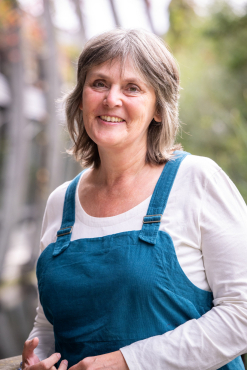You are here
- Home
- Dr Karen Potter
Dr Karen Potter
Professional biography
Karen joined the School of Engineering and Innovation and the Built Environment Cluster in 2021, as a Research Fellow on 'Project Groundwater'. Together with lead/P-I Alice Moncaster, Karen is working on Project Groundwater as part of Buckinghamshire Council’s consortium of partners to improve community resilience to groundwater flooding across the chalk streams of the Chilterns. This partnership is one of 25 projects, part of the Government’s Flood and Coastal Resilience Innovation Programme to inform future approaches and investment in flood risk management. Karen is also an Associate Lecturer for the School's first year UG module, U116 Environment: journeys through a changing world, and works across faculties but still with the environment, on the second year module DST206 Environment: sharing a dynamic planet in the Faculty of Arts and Social Sciences (FASS).
With a background in environmental management and planning, Karen initially worked in practice at the Forestry Commission and then as a Local Authority Planner, involved in the development of regeneration partnerships and task groups across departments, government agencies and stakeholders (flood risk, water quality, access, natural environment). It was due to the institutional challenges experienced as a practitioner, endeavoring to implement novel policy in natural flood risk management (making space for water), that she returned to academia and was drawn to interpretative policy analysis to challenge environmental policy transition and implementation. Following her PhD and lectureship in the Department of Geography and Planning, University of Liverpool (2008-2016), Karen then joined the OU in 2016 as a Research Fellow in Collaborative Governance in the Department of Public Leadership and Social Enterprise (PuLSE) within the OU's Business School. There she was involved with one of the University's priority research areas aimed at addressing 21st century global challenges, Citizenship and Governance, rethinking the changing relationships between states, markets and citizens in the 21st century and the challenges of governance and leadership - namely with adaptation to climate change. Karen extended her interdisciplinary research to collaborative governance theory, to gain further insight into the challenges faced by practitioners and policy makers involved in water management, wider environmental partnerships and climate change adaptation. She remains a Visiting Fellow with PuLSE and still collaborates with colleagues, including in the Centre for Voluntary Sector Leadership.
Education and qualifications:
- Certificate in Professional Studies in Learning and Teaching (Distinction), University of Liverpool (2012-2015)
- PhD, Department of Geography & Planning, University of Liverpool (2008-2012) - 'Battle for the Floodplains: An Institutional Analysis of Water Management & Planning in England'
- MCD (Distinction), Town and Country Planning, University of Liverpool (2004-2006)
- MSc Environmental Management, University of Sunderland (1991-1992)
- BSc (Hons) Neurobiology, University of Sussex (1986-1989)
Research interests
Karen's research explores policy and practical innovations through theoretically or conceptually informed lenses. Although she still sees herself as a ‘pracademic’, connecting theory to effect practice; to understand the feasibility of policy implementation within the limits of often dominant neo-liberal and techno-centric discourses. She is currently working with the Project Groundwater partnership to increase (a critical) understanding of what is a fluid concept of community resilience, how the technical innovations of the project can be co-produced and their social impacts evaluated with communities. Her initial interest (at Liverpool) was in the integration of spatial planning and flood risk management, particularly natural flood management, understanding the socio-political forces that increase flood risk, how spatial planning policy can contribute to risk governance in hazard-prone areas, how planners can integrate with neighbouring sectors and stakeholders to bring about land use change and resilience to climate change. As her own academic background spans the natural and social sciences, in addition to being applied and practitioner facing, she is drawn to transdisciplinary and interdisciplinary approaches, working with engineers, physical geographers, ecologists, environmental scientists and other disciplines within and external to the OU.
Previous research projects and activity include:
- Achieving Urban Flood Resilience in an Uncertain Future, OU PI (Consortium Lead - Colin Thorne, University of Nottingham), £270k, EPSRC (2016-2019)
- Open University Strategic Research Area, Collaborative Governance Theory in ‘Catchment Partnerships’, PI £5k, OU Internal Funding (2016)
- University of Liverpool Faculty Teaching Pilot (Environmental Sustainability); Co-I, After the earthquake – adapting to large changes in student cohorts (2015)
- WaterCore Action Group on Regional Governance of Water Scarcity and Drought Issues; Co-I, EC European Innovation Partnership
- Knowledge Transfer Partnership; Breakdown of Institutional Barriers to Natural Approaches to Flood Risk Management, PI £138k, NERC/Welsh Government/Technology Strategy Board (2012-2016)
- Celtic Seas Partnership (CSP); Co-I, LIFE+ EC (2013-2016)
- Pioneers in Urban-Rural Entrepeneurship Hub; Co-I, Interreg EC (2012-2014)
PhD Supervision (at the OU):
Lindsey Elliott Enabling collaboration in the conservation sector (2017-2022, with Siv Vangen as Primary Supervisor in PuLSE, the Business School)
Editorial Reviewer:
Journal of Comparative Policy Analysis; Journal of Flood Risk Management; International Journal of Water Governance; Town Planning Review; Journal of Environmental Assessment Policy & Management
Teaching interests
Karen is an Associate Lecturer on two undergraduate modules, level one U116 Environment: journeys through a changing world and level two DST 206 Environment: sharing a dynamic planet in the Faculty of Arts and Social Sciences (FASS). She is also interested in scholarship, in particular understanding and improving communications and collaboration between the student support team and ALs to enhance the quality of student support, having undertaken two short projects (working with the E&I Student Support Team, (in the STEMA SRSC) (with Sinead O'Connor-Gotra, and Project Leads: Daphne Chang and Stephen Jones, sponsored by the Associate Dean - Student Experience, 2019-22). Karen has also worked with colleagues in the Open University Wales/Y Brifysgol Agored (Helen Thomas, Partnerships Co-ordinator) on Pathways to the Environment, to discuss the role and challenges faced by the third sector on environmental issues – how a changing environment might influence what we do; and how can we live and work more sustainably and to introduce third sector and other interested parties to OpenLearn and the formal environment qualification pathways at the OU.
As a previous Lecturer (School of Environmental Sciences, University of Liverpool, 2011-2016) Karen contributed to the continued development of a varied portfolio of UG, PGT and PGR modules and programmes in Planning, Geography and Environmental Management. She was the module co-ordinator for Masters Dissertations (50-100 students), 2nd yr UG Environmental Sustainability (100-180 students), contribution to Spatial Planning in Action, Cities and Regions,Human Impacts on the Environment, Green Infrastructure, Making Plans and Planning Practice Placement. She was Director of Postgraduate Research for Planning, with overarching responsibility for 34 PhD students, moderator for Xi'an Jiaotong-Liverpool University (XJTLU) China modules and former discipline Assessment Officer, delivering on and advising on the University's design, implementation and review of assessment, e.g. academic integrity policy, progression requirements, Module Review Boards and the External Examination process.
Karen's previous pedagogical research explored interdisciplinary perspectives in ‘Education for Sustainable Development’ and the lecturer’s challenge of implementing the University strategy of internationalisation of the curriculum at the ‘chalk face’. She was Co-I in the University of Liverpool Faculty Teaching Pilot (Environmental Sustainability), 'After the earthquake adapting to large changes in student cohorts' (2015).
Qualifications and Awards:
- Certificate in Professional Studies in Learning & Teaching in Higher Education [CPS] with Distinction
- HEA Fellowship (2016-ongoing)
- Green Gown Award Finalist 2016, Environmental Association for Universities & Colleges (EAUC) http://www.greengownawards.org/green-gown-awards-uk-ireland
- Faculty Learning and Teaching Award winner (2015) Spatial Planning in Action
Impact and engagement
Karen is a member of the Welsh Government's Flood and Coastal Erosion Committee, with the committee's role of advising Welsh Ministers on all flood and coastal erosion risk management matters in Wales, including raising awareness, preparation and community resilience to flooding. She is a current member of the Resources Sub Committee, tasked with reviewing resources to deliver effective FCERM services. Karen's specific remit is to consider the support to communities and the role of the voluntary sector.
She is also a member of the Defra/EA/WG/NRW Thematic Advisory Group (TAG) for Flood Risk Management Policy, Strategy and Investment (2014-present). Theme Advisory Groups (TAGs) support Defra/EA/WG/NRW Joint Programme of flood and coastal erosion risk management research and development in a horizon scanning capacity and in the development of research proposals. She was previously Chair and Deputy Chair of the RTPI Cymru/Wales Policy and Research Forum (2010 – 2017).
Karen has previously worked with a number of organisations across the North West, including the Ribble Rivers Trust and Ribble Life as part of DEFRA's more holistic catchment-based approach to better engage with people and organisations in river basin management.
Externally funded projects
Groundwater Resilience & Community Engagement (GRACE) Studentship
| Role | Start date | End date | Funding source |
|---|---|---|---|
| Lead | 01 Oct 2022 | 30 Sep 2025 | DEFRA (Department for Environment Food and Rural Affairs) |
GRACE (Groundwater Resilience and Community Engagement) is a £7.37m project funded by Defra and led by Buckinghamshire Council, running from April 2021-March 2027. Groundwater flooding can be devastating - harder to predict, longer lasting and more invasive than either fluvial or sea flooding. The project will explore and trial innovative approaches to managing groundwater flooding, particularly in the chalk stream areas of the Chilterns. The innovations are both technical, including novel monitoring approaches and developing nature based solutions (NBS), and social, working closely with local communities to increase two-way understanding of the problems and resilience. The OU team will work with Bucks Council and the 25 other project partners to understand how the interface between community engagement and technical innovations will deliver greater benefits and social value.' | |||
Groundwater Resilience & Community Engagement
| Role | Start date | End date | Funding source |
|---|---|---|---|
| Lead | 01 Oct 2021 | 31 Mar 2027 | DEFRA (Department for Environment Food and Rural Affairs) |
Groundwater flooding has seen the lowest levels of investment, action and consideration by risk management authorities compared with the focus of attention seen by fluvial and coastal and more recently surface water flooding. Yet, the impacts of groundwater flooding can be more devastating and severe than from other sources. The flooding can last for weeks or even months, which results in very high social and economic impacts. Groundwater flooding typically affects isolated pockets of communities and often fails to qualify for standard resilience measures and schemes. In addition to the considerable damage and distress to people and communities, structural damage to buildings and roads tends to result from the prolonged inundation. Drainage and sewer networks are soon overwhelmed, with ingress into foul sewers leading to contaminated water and people unable to use toilets, showers etc for long periods of time. The likely increase of groundwater flooding due to climate change adds to the problem. As with many other areas of the country, in the unconfined chalk aquifers of the Chiltern Hills and Berkshire Downs there are significant areas of groundwater flood risk. These 35 catchments, covering 180+ communities and 70,000 properties known to be at risk, are highlighted in the map found in Appendix 1. Whilst the area is broadly understood however, the detail of knowledge and understanding of groundwater flood risk is limited. This is illustrated by the very limited or entire lack of mapping and modelling, and the knock-on effect of this is that there is no coordinated response or preparation. There is no flood warning system in place for groundwater flooding in these areas. This makes it very difficult for communities to prepare for, or then recover from, flooding. Traditional engineered flood schemes are also generally difficult to justify due to the often dispersed and infrequent nature of the floods. A move towards an adaptive approach that builds resilience in communities is therefore needed. The dispersed nature of the communities impacted leads to lack of cohesion and support between impacted communities. In addition to the considerable damage and distress to people and communities, structural damage to buildings and roads tends to result from the prolonged inundation. Drainage and sewer networks are soon overwhelmed, with ingress into foul sewers leading to contaminated water and people unable to use toilets, showers etc for long periods of time. The likely increase of groundwater flooding due to climate change adds to the problem. The similarly dispersed nature of the communities also leads to a lack of cohesion and mutual support. | |||
Publications
Journal articles
A conceptual framework for understanding community resilience to flooding (2024)
Nsobya, C.; Moncaster, A.; Potter, K.; Mabon, L. and Ramsay, J.
IOP Conference Series: Earth and Environmental Science, 1363, Article 12078
Managing urban flood resilience through the English planning system: insights from the ‘SuDS-face' (2020-04)
Potter, Karen and Vilcan, Tudorel
Philosophical Transactions of the Royal Society A: Mathematical, Physical and Engineering Sciences, 378, Article 20190206(2168)
Delivering sustainable drainage systems through the English planning system: A proposed case of institutional void (2020-03)
Vilcan, Tudorel and Potter, Karen
Journal of Flood Risk Management, 13(1) (e12591)
The blue-green path to urban flood resilience (2020-01-01)
O'Donnell, Emily; Thorne, Colin; Ahilan, Sangaralingam; Arthur, Scott; Birkinshaw, Stephen; Butler, David; Dawson, David; Everett, Glyn; Fenner, Richard; Glenis, Vassilis; Kapetas, Leon; Kilsby, Chris; Krivtsov, Vladimir; Lamond, Jessica; Maskrey, Shaun; O'Donnell, Greg; Potter, Karen; Vercruysse, Kim; Vilcan, Tudorel and Wright, Nigel
Blue-Green Systems, 2(1) (pp. 28-45)
Exploring the potential for collaborative leadership through a policy lens: a comparative analysis of children's services and flood risk management (2020)
Jacklin-Jarvis, Carol and Potter, Karen
International Journal of Public Administration, 43(16) (pp. 1386-1396)
Natural Flood Management: Beyond the evidence debate (2019-12)
Wingfield, Thea; Macdonald, Neil; Peters, Kimberley; Spees, Jack and Potter, Karen
Area, 51(4) (pp. 743-751)
Introducing Adaptive Flood Risk Management in England, New Zealand, and the Netherlands: The Impact of Administrative Traditions (2018-11-28)
van Buuren, Arwin; Lawrence, Judy; Potter, Karen and Warner, Jeroen F.
Review of Policy Research, 35(6) (pp. 907-929)
A tale of two states? A comparative study of cross-sector collaboration in children’s services and flood risk management (2018-03-31)
Jacklin-Jarvis, Carol and Potter, Karen
Voluntary Sector Review, 9(1) (pp. 89-97)
Responding to a ‘flood of criticism’: analysing the ebbs and flows of planning and floodplain development in England (1926–2015) (2016-03-30)
Potter, Karen; Ludwig, Carol and Beattie, Charlotte
Town Planning Review, 87(2) (pp. 125-138)
"What’s Love Got to Do With It?" Some reflections on the Internationalisation of planning education (2015-07)
Sykes, Olivier; Jha-Thakur, Urmila and Potter, Karen
Planning Education, 3 (pp. 82-91)
Making space for institutional change? A comparative case study on regime stability & change in river flood management in the Netherlands & England (2015)
Van Buuren, Arwin; Potter, Karen; Warner, Jeroen and Fischer, Thomas
International Journal of Water Governance, 3(3) (pp. 81-100)
Municipal waste management strategies: strategic environmental assessment and the consideration of climate change in England (2011-12)
Fischer, Thomas B.; Potter, Karen; Donaldson, Stuart and Scott, Tony
Journal of Environmental Assessment Policy and Management, 13(4) (pp. 541-565)
Engineers and planners: sustainable water management alliances (2011-12)
Potter, Karen; Ward, Sarah; Shaw, David; Macdonald, Neil; White, Iain; Fischer, Thomas; Butler, David and Kellagher, Richard
Proceedings of the Institution of Civil Engineers - Engineering Sustainability, 164(ES4) (pp. 239-247)
Book chapters
Cementing “Stakeholder Collaboration” into Flood Risk Management (2022-04-04)
Potter, Karen
In: Eslamian, Saeid and Eslamian, Faezeh A. eds. Flood Handbook: Principals and Applications (pp. 171-192)
ISBN : 9781003262640 | Publisher : CRC Press, Taylor & Francis Group
Blue-Green Cities: Achieving Urban Flood Resilience, Water Security, and Biodiversity (2021)
Krivtsov, V.; Ahilan, S.; Arthur, S.; Birkinshaw, S.; Dawson, D.; Everett, G.; Glenis, V.; Kapetas, L.; Kilsby, C.; Lamond, J.; Mendoza Tinoco, D.; Ncube, S.; O’Donnell, E.; O’Donnell, G.; Potter, K.; Vilcan, T.; Wright, N. and Thorne, C.
In: Brears, R ed. The Palgrave Encyclopedia of Urban and Regional Futures
Publisher : Palgrave Macmillan, Cham
Finding "Space for Water": crossing concrete policy thresholds in England (2012-11-01)
Potter, Karen
In: Warner, Jeroen Frank; Van Buuren, Arwin and Edelenbos, Jurian eds. Making Space for the River: Governance Experiences with Multifunctional River Flood Management in the US and Europe (pp. 89-101)
ISBN : 9781780401126 | Publisher : IWA Publishing | Published : London
Conference items
How to Evaluate Catchment Based Partnerships & Avoid a Watered Down Approach? (2019)
Potter, Karen and Jacklin-Jarvis, Carol
In : 2019 Voluntary Sector and Volunteering Research Conference: A civil society for the future: setting the agenda for the voluntary sector and volunteering research in the 2020s (10-11 Sep 2019, Aston University, Birmingham, UK)
Brokering relationships with the state: what new understandings can ‘environmental catchment VOs’ filter from the social welfare domain? (2018)
Potter, Karen and Jacklin-Jarvis, Carol
In : The Voluntary Sector and Volunteering Research Conference 2018 (6-7 Sep 2018, London, UK)
Collaboration and the governance of public services delivery (2017-11-08)
Vangen, Siv; Potter, Karen and Jacklin-Jarvis, Carol
In : Symposium on the policy and reform trajectory of public services in the UK and Japan (8-9 Nov 2017, Japan)
Collaborative public leadership: does problem context matter? (2017-03-27)
Jacklin-Jarvis, Carol and Potter, Karen
In : 2nd International Public & Political Leadership (PUPOL) Conference - Leadership for Public and Social Value (06-07 Apr 2017, The Open University, Milton Keynes, UK)
How does problem context matter for cross-sector collaboration? A comparative study of voluntary sector engagement in children’s services and flood management (2017)
Jacklin-Jarvis, Carol and Potter, Karen
In : The Voluntary Sector and Volunteering Research Conference 2017 (Sep 2017, Nottingham, UK)
Hydrology and Spatial Planning (2010)
Macdonald, Neil; Potter, Karen and Ward, Sarah
In : British Hydrological Society: Proceedings of the Third International Symposium (2010) (pp. 659-662)
Spatial Planning and Floodplain Restoration - in the ‘Pitts’? (2009-04-01)
Potter, Karen
In : 10th River Restoration Conference (1-2 Apr 2009, University of Nottingham, UK)
Turquoise is the New Green – Planning Space for Water (2008)
Potter, Karen
In : UK-Ireland Planning Research Conference 2008 (Sustainability, Space and Social Justice) (18-20 Mar 2008, Queen's University, Belfast, UK)
Thesis
Battle for the Floodplains: An Institutional Analysis of Water Management
and Spatial Planning in England (2013-06)
Potter, Karen
PhD thesis University of Liverpool




